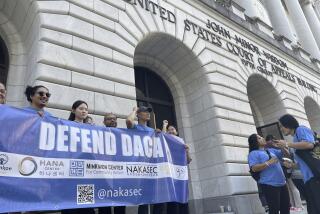Legal fight continues over Obama’s executive action on immigration
- Share via
Reporting from Houston — To hear the White House tell it, a federal judge in Texas “has wrongly continued to prevent those lawful, common-sense policies from taking effect.”
The judge, meanwhile, says of Obama administration attorneys: “Whether by ignorance, omission, purposeful misdirection, or because they were misled by their clients, the attorneys for the government misrepresented the facts.”
And so the legal jousting continues over President Obama’s executive action shielding millions of people from deportation and the judge’s order putting those efforts on hold.
In a pair of rulings Tuesday night, U.S. District Judge Andrew S. Hanen of Brownsville refused a government request to allow the Obama programs to resume while broader issues are being litigated. The move leaves the status unchanged of up to 5 million immigrants in the U.S. illegally.
A coalition of 26 states led by Texas is fighting Obama’s executive action. The president’s move, announced in November, expanded the pool of people who could receive some legal immigration standing to include the parents of U.S. citizens or legal permanent residents.
Obama also wanted to increase from two years to three years the Deferred Action for Childhood Arrivals, or DACA, program, designed to help so-called Dreamers.
“The district court in Texas has wrongly continued to prevent those lawful, common-sense policies from taking effect — even in the many states where local leaders and law enforcement officials have said they support the executive actions and expect their communities to benefit from them,” a White House representative speaking on background said Wednesday. “The Department of Justice has appealed the district court’s decision and sought an emergency stay from the U.S. Court of Appeals for the 5th Circuit.”
Texas officials praised the rulings by Hanen.
“The administration’s request had no legal grounds and proves that we are dealing with a president that disregards the rule of law and the system of checks and balances that are key to the Constitution,” Texas Gov. Greg Abbott said in a statement.
For Jose Palacios of Tampa, Fla., the rulings by the conservative south Texas judge were no surprise.
“We knew his stance … what his intentions are: to continue to hurt immigrant families across the country,” Palacios said. “It looks like we have to continue to fight.”
Palacios, 23, has been shielded from deportation under DACA. His mother, who came to the United States illegally from Mexico more than 20 years ago, had hoped to apply for a similar program for parents known as DAPA before the lawsuit. Three of Palacios’ siblings have DACA status, five are citizens.
Since the lawsuit began, he said his mother had grown discouraged. “Sometimes my mom loses hope that anything is going to happen,” Palacios said.
He said he planned to explain Tuesday night’s rulings to her, adding that he would be in New Orleans next Friday to protest ahead of the 5th Circuit’s hearing on the government’s appeal.
Earlier this week, a panel of the 5th Circuit rejected a challenge to Obama’s 2012 executive action, upholding a lower court’s ruling in a case involving Mississippi and some border agents.
Anne Joseph O’Connell, a UC Berkeley law professor, said the big question the 5th Circuit would have to address was whether Texas and the other states had standing to file suit against the federal government.
“A lot of times conservatives are less likely to grant standing,” she said, as the 5th Circuit refused to in the recent Mississippi case, reaffirming the similarly conservative lower court’s denial of standing.
“That’s the best chance with a conservative panel for President Obama and the Department of Homeland Security to go forward” with DAPA and the DACA extension, she said.
If the panel of appeals court judges finds the states do have standing to sue, O’Connell said, “Then you get to this question of whether [DACA and DAPA] should have been done with prior notice and public comment.”
In his latest actions, Hanen issued two orders — one refusing to lift his injunction halting the administration’s programs, the other detailing what he called the federal government’s misleading statements. (This is what prompted his comment about ignorance, omission and purposeful misdirection.)
The Deferred Action for Parents of Americans and Lawful Permanent Residents, or DAPA, would affect more than 4 million people who have lived in the United States for at least five years and are the parents of U.S. citizens or legal permanent residents.
It would offer three-year work permits to parents who qualify.
The DAPA action also included a provision to change DACA. And this is where the confusion began.
The DAPA executive action included expanded deferred action for qualified DACA applicants, from a two-year reprieve to three years. Although 26 states were suing to block DAPA, government lawyers allowed DACA applicants to apply for a three-year reprieve.
More than 100,000 did.
Hanen, at times visibly angry in the earlier hearings, wasn’t informed of the accepted applicants for weeks after the lawsuit began and threatened to sanction the Justice Department if he found that government lawyers had misled him about the rollout of the immigration actions.
Hennessy-Fiske reported from Houston and Duara from Tempe, Ariz.
Times staff writers Michael Muskal in Los Angeles and Christi Parsons in Washington contributed to this report.
More to Read
Sign up for Essential California
The most important California stories and recommendations in your inbox every morning.
You may occasionally receive promotional content from the Los Angeles Times.












